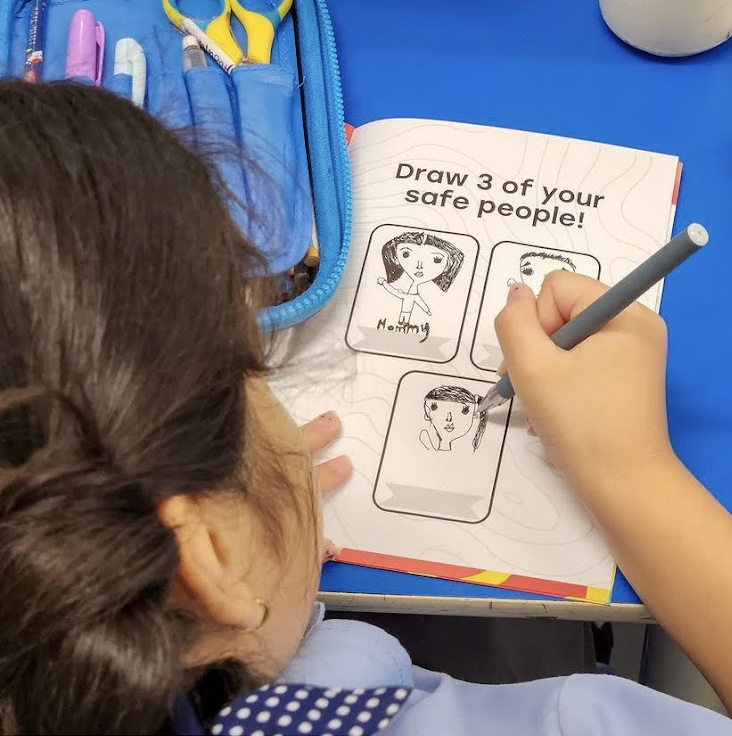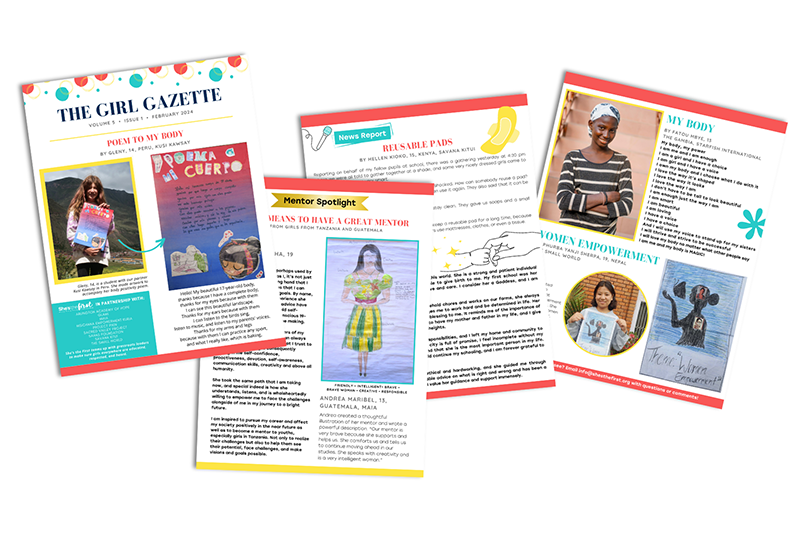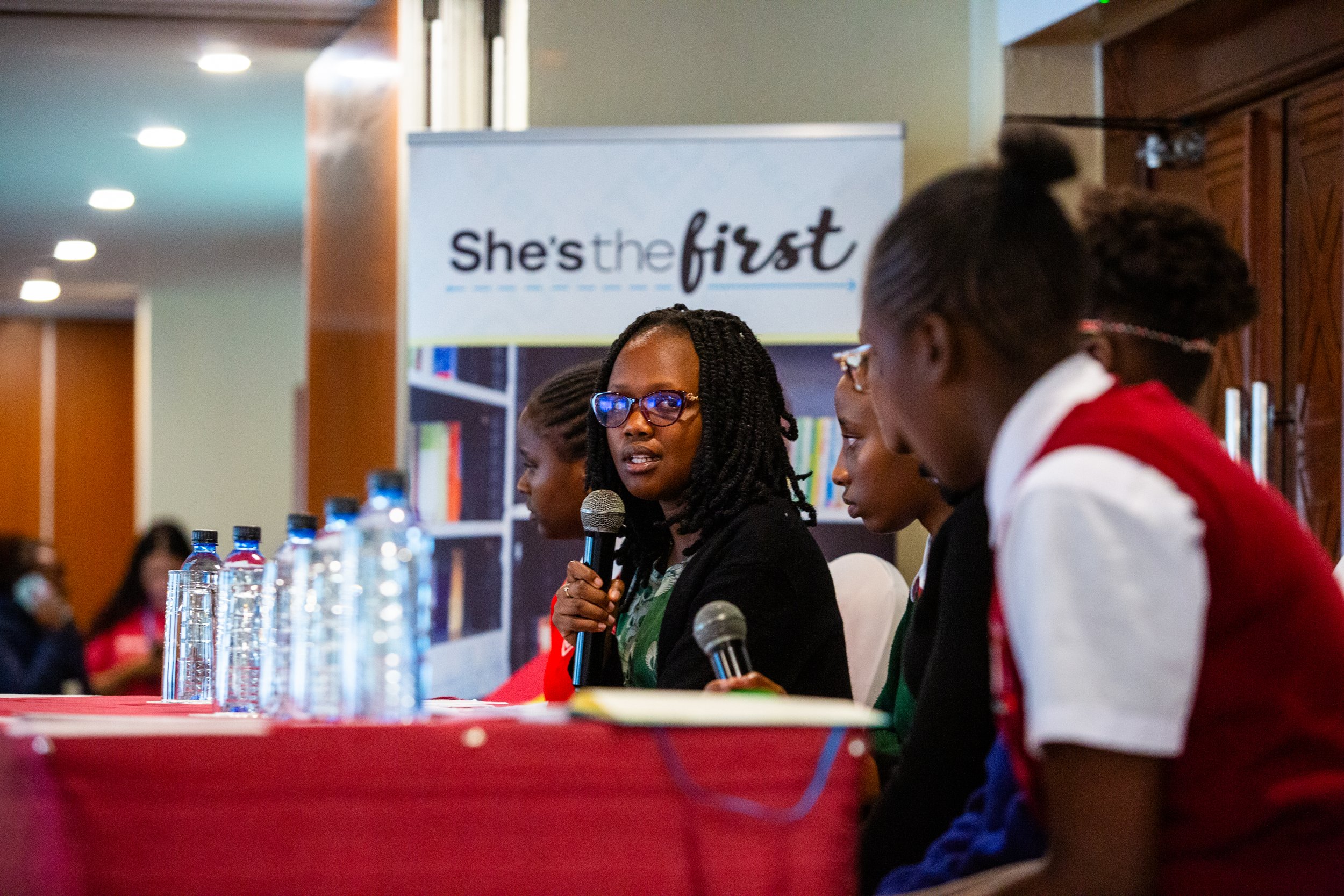The effects of climate change are not experienced equally. While everyone experiences the negative impacts of climate change, existing gender inequalities can add layers of additional obstacles for girls. Here are some ways that climate change disproportionately impacts women and girls.
Why Poetry is an Important Tool for Girls' Empowerment
A First-Gen College Student on Applying During a Global Pandemic
College is a tricky topic in First Generation applicants' households. There’s always a tension between support and willingness for continuous learning. The feeling of loneliness and abandonment of knowledge about colleges are the norms. When everything was changing around me last spring, I found myself collectively questioning how the college application season will work out for me.
Why Feminism is Important to Me
What Girls Have to Say about Girls' Rights in Afghanistan
Demanding a Power Shift in Education
In Conversation with Actress/Activist Malia Baker
Hi, everyone! I’m Dani Antonio, the Community Engagement Intern at She’s the First from the Philippines! This past year, I’ve played a special role in STF’s girl-led advocacy efforts. I have a voice in our social media and I get to participate in influential conversations about girls’ rights.
Recently, I joined an Instagram Live hosted by Malia Baker, a 14-year-old actress and activist. You’ll find her starring as Mary Anne on Netflix’s The Baby-Sitters Club and as Gabby on Nickelodeon’s Are you Afraid of the Dark? Off screen, she uses her powerful platform to advocate for gender and racial justice.
Along with the Co-Founder/CEO of She’s the First, Tammy Tibbetts, and Girls Advisory Council member Anuli Ononye, and myself, Malia talked about her journey as an activist. I was really inspired by her and everyone’s genuine drive and passion in striving for representation. As Malia said, it shows us girls that we have a place at the table.
In this chat, you’ll hear us talk about the She’s the First Girls Advisory Council and Youth Ambassador program. With that being said, I want to encourage you to get involved! Positions are open now and you can apply by June 11th here.
Enjoy the conversation!
Reflections on Being "Sponsored"
She’s the First has always funded local organizations and trusted their expertise, but we have made significant adaptations to shift more power to them. In 2017, we moved away from our traditional scholarship (or sponsorship) fundraising model, in which donors were matched 1:1 with a girl they supported.
What Remote Learning Has Taught Me About Girls & COVID-19
Author: Anika Mukker, She’s the First Campus Community
I’m terrible with dates, but I’ll never forget March 13. That was the day my school announced that we would not be returning for four weeks due to the COVID-19 pandemic. Four weeks turned into seven months, and now I’m in 11th grade through distance learning.
Education has always been one of the most important parts of my life, and my love for learning was the driving factor for me getting involved with She’s the First. Nevertheless, adapting to virtual school has been challenging. Personally, having tangible projects helps me remain organized and engaged, and I value face-to-face interaction with teachers and peers. In fact, most of my closest friendships have all been built out of decade-long connections through school.
“Four weeks turned into seven months, and now I’m in 11th grade through distance learning.”
But, the pandemic has taught us is that we, as people, especially girls, are incredibly creative and resilient. Nowadays, I dedicate more time to planning out my routine and self-care while leveraging technology to maintain my connections and continue learning. I also try to participate as much as I can in online lectures -- asking questions, engaging in discussion, and putting a little more effort into connecting with my teachers.
However, COVID-19 and remote learning have also taught us that we cannot disregard the disproportionate impact of global crises on girls.
In April 2020, She’s the First published their Girls Can’t Wait report which states that over 750 million girls have been affected by the pandemic, and the Malala Fund projects 20 million more girls will not return to school when this is over, for a total of ~150 million girls out of school. A follow-up report published in September 2020 further details the severe impact—from steadily rising teenage pregnancy rates to increases in the number of girls working outside of their homes.
“For many, being taken out of school is more than losing out an education. It’s losing out on a safe space, a place to create dreams, and a network of support. ”
With schools being closed and students being forced to learn remotely, girls are separated from important connections with friends, teachers, and mentors as well as important programs. For many, being taken out of school is more than losing out an education. It’s losing out on a safe space, a place to create dreams, and a network of support.
All of this is coupled with the fact that the COVID-19 pandemic has exasperated the digital divide both on a professional and school level. In the same follow up report, community-based organizations also found that only 25% of girls have access to a tech device to aid in their learning.
With inequitable access to technology, girls' voices are quieted; they are unable to speak out on the issues that affect them, gain equal access to opportunities, and utilize necessary tools for their education. Right now, bridging this divide is more important than ever. Technology is an integral part of remote learning and provides a vital means for receiving an education even while schools are shut down.
“My computer, stable WiFi, and phone are the tools that have truly helped me succeed during this pandemic.”
As much as planning and organization have helped me with distance learning, simple things like my computer, stable WiFi, and phone are the tools that have truly helped me succeed during this pandemic. Without them, my questions would be left unanswered; I would not be able to take hold of opportunities in learning and advocacy.
So let our voices be heard: girls can’t wait. All girls have a right to an education, and we need to keep fighting until even a global pandemic cannot take that away.
Support the COVID-19 Response Fund to support girls’ most urgent needs through this pandemic, including remote access to education, hygiene kits, and more.
About Anika: Anika is a junior at Vista Del Lago High School in Folsom, California and the president/founder of her school’s She’s the First chapter. She’s extremely passionate about girls’ rights, especially when it comes to education and how girls lie at the intersection of so many different issues. Outside of STF, she’s involved in Model United Nations, as she aspires to study international relations in the future. In her spare time, she also loves to draw, write, listen to music, travel, and spend time with her loved ones.
How the Girls' Bill of Rights Lives On -- One Year Later
Author: Vishaka Agrawal
Contributors: Faith Nwando, Genevieve (Jenny) Niwenambaza, & Claris Nadini
Around the world, having explicit documentation of major policies and laws help ensure consent and set expectations. So having the Global Girls’ Bill of Rights officially documented makes us feel more empowered than ever.
The bill, which was passed at the United Nations HQ and with UN Women in October 2019 on the International Day of the Girl, was co-organized by She’s the First, Akili Dada in Kenya, and MAIA Impact in Guatemala, and it can be used as a reference by any girl around the world to demand their rights.
One year later, we still have a long way to go in terms of the implementations of the rights featured within smaller communities, but we feel extremely fortunate that we could take this very crucial step towards a fairer, more inclusive world. Throughout the experience, we met really inspiring girl advocates and had the opportunity to represent the voice of girls from more than 30 countries. Helping draft the bill and sharing ideas with panelists from 15 different communities (and across timezones) was a proud experience.
“The bill reaching governments of all countries will mean impact across more local communities where the majority of discrimination happens.”
The Global Girls’ Bill of Rights is the first step to ensure that girls are not denied their basic rights, and it is also a step towards achieving the potentially less obvious rights like the right to pursue STEM and representation in leadership roles. The bill reaching governments of all countries will mean impact across more local communities where the majority of discrimination happens.
We also request social media followers and influencers, global leaders, and students to help us widen our reach and amplify the impact of the bill, because it is easy to take for granted these rights when we are privileged and do not see the social problems that exist even in our own institutions.
Vishakha (left) and Faith (right) at the UN
Alongside myself, fellow girl activists Faith, Claris and Jenny were also part of the panel that worked on the wording of the bill and finalized the final ten rights. Faith and I were two of six girls to present the bill to the Deputy Secretary General of the United Nations. Later that day, we had an interview with NPR. The two of us also spoke at the annual She’s the First Summit, where I talked about inclusion in STEM (being a girl in computer science myself) and Faith introduced one of our guest speakers Isha Sesay who reported about the missing girls in Nigeria (especially with the issue being very close to Faith’s heart).
Since launching the bill, it has impacted our own engagement across our campuses. I came back to India after the event and started the first Women in Computing chapter of my college which now has more than 300 active members. This paper in Nature, a top-tier science journal shows that women are only rarely featured as the first or last author in leading journals, so now I organize research-themed events to facilitate discussions between faculty researchers and female students to expose them to the research community.
The right to education was the most important part of the bill for Faith. Where she lives in Maine, there is a large population of immigrants from Salmi and most kids are non-English speakers. Today, she regularly takes part in touring local high school students around, since the teachers face difficulties supporting the needs of all the students.
Moving forward, we want to make sure that every girl is aware that the Girls’ Bill of Rights was passed at a global level, in a way that supports their rights, so that they can demand it without any hesitation. No one should be denied these basic rights. Striving tirelessly towards a better, more inclusive world is a responsibility of every citizen.
About the author: Vishakha Agrawal is a Computer Science undergrad from India. She is passionate about empowering girls pursuing STEM, especially research in Computer Science. You can hear more from Vishakha on Twitter (vishakha__a) and on her LinkedIn (vishakha-a).
About the contributors:
Faith Nwando, originally from Nigeria, is a high school senior in NYC. She is an active member of her college communities and a fierce advocate of girls’ rights.
Genevieve (Jenny) Niwenambaza lives in Kigali, Rwanda. She is in her last year of university at Davis college, Akilah campus. She is 21 years old and a proud feminist. You can find her on Twitter (nizagenevieve) and on Instagram (jennygeniale).
Claris Nadini is a Mechanical Engineering student at Ashesi University. She is the Chair of Badili Zone Organization that upholds education in Mukuru Community in Kenya. Claris is passionate about extending educational opportunities and bringing positive change to political leadership in Kenya. Find her on Twitter (ClarisNadini) and on Instagram (clarisnadini).














